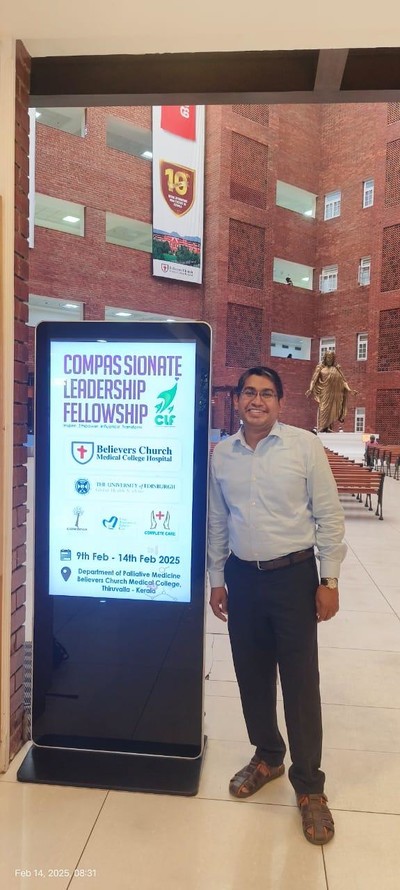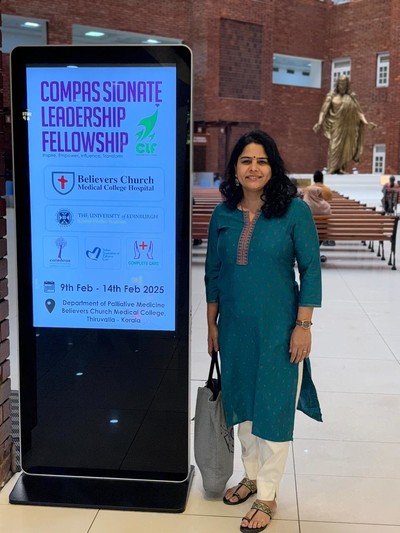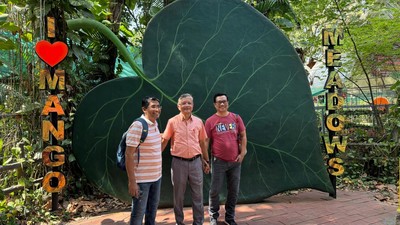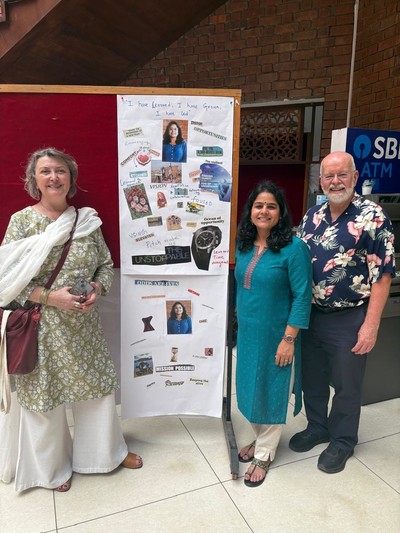
Blog: Compassionate Leadership Fellowship: The Fellows’ Retrospective
![]() Cameron Don
Cameron Don
![]() 2nd July 2025
2nd July 2025
In February this year, the Compassionate Leadership Fellowship came to its conclusion, marking the end of a year of growth, learning and development for our cohort of palliative care leaders from across India, Nepal, Kenya and Rwanda. I reached out to two of our fellows, George Varghese and Keshav Sharma to ask them about their experience of the CLF course and to find out what impact it has had on them, personally and professionally.
Firstly, George and Keshav introduce themselves and their work to our readers and supporters.
George
Hello, I'm George Varghese, a highly experienced healthcare leader with more than two decades of experience, cutting across palliative care, hospital administration, and community-based public health. I am presently working as the Director of Community Health Projects at Kachhwa Christian Hospital, Uttar Pradesh, overseeing multi-village interventions for communicable & non-communicable disease and palliative care.
Keshav
I’m Keshav Sharma, Psycho-oncologist and Grief therapist with over a decade of experience supporting patients, caregivers, and healthcare professionals across India. My work lies at the intersection of mental health, palliative care, and compassionate leadership, and I’m deeply committed to creating spaces of dignity, presence, and healing in cancer care.
I’m focused on integrating mental health into palliative care through presence, dignity, and culturally sensitive care.
Beyond clinical practice, I find deep meaning in teaching what I learn from the therapy room. I’ve had the privilege of mentoring hundreds of students and professionals and serve as faculty for national and international palliative care training programs. For me, sharing knowledge is a way of sustaining the work of planting seeds of empathy, dignity, and presence in those who care for others.
- What impact has the CLF had for you?
George
The Compassionate Leadership Fellowship (CLF) has profoundly and multifacetedly impacted both my personal and professional life. It provided a structured process for deep self-evaluation, helping me become more self-aware and intentional on my leadership journey. The course fostered a safe space for reflection and growth, leading to significant positive changes in my relationships—especially with my daughter—and in my emotional resilience. It helped me recognize unhelpful patterns like perfectionism and taught me to embrace vulnerability, humility, and authenticity. Most importantly, it instilled in me a renewed sense of purpose and a stronger, values-driven leadership identity. The CLF has been a transformative journey for me. It was not just a training program but a deeply personal and spiritual experience. It acted as an eye-opener, leading to profound self-realization and a deeper understanding of others. Each session challenged and equipped me to face greater challenges in life with empathy and strength. The stories shared, the bonds formed, and the lessons learned have left a lasting impact on my heart and mind. CLF didn’t just educate—it healed, inspired, and provided me with a new lens to view myself and the world around me.
Keshav
Compassionate Leadership Fellowship has had a profound impact on my approach to both my personal and professional journey. The fellowship helped me integrate compassion into the structural framework of my leadership style, rather than viewing it merely as an emotional response.
The most profound impact has been the recognition that vulnerability and strength are complementary rather than contradictory. Working in psycho-oncology along with grief therapy, I've always acknowledged the emotional weight our patients carry, but I previously maintained professional distance as a leader. The fellowship taught me that authentic leadership requires embracing my own humanity and sharing appropriate vulnerabilities with my team.
This paradigm shift has allowed me to create deeper connections, both with patients facing cancer diagnoses and team members navigating the emotional complexities of clinical work with the patients. I have moved from a mindset of "leading from the front" to "walking alongside" my team, which has fostered greater trust and collaboration.
Another important area of learning for me was on role of mentorship, owing to how my mentor guided and mentored me through the process of learning throughout the year with his patience and presence.
2. How has the CLF changed you as a leader?
George
CLF has completely transformed my approach to leadership in both mindset and practice. I have become more reflective and patient, choosing to listen deeply and act with compassion rather than react impulsively. The Leadership Practices Inventory (LPI) and tools like personality and conflict style assessments have helped me identify key areas for growth and develop a leadership style grounded in empathy, courage, and collaboration. I now prioritize nurturing others, aligning with team strengths, and creating space for shared decision-making. The mentorship I received has also built my confidence and provided me with a clearer, more strategic approach to navigating challenges. CLF has allowed me to rediscover and redefine myself as a leader. It has illuminated previously concealed aspects of my leadership journey and clarified my purpose. I have learned that vulnerability is not a weakness, but a powerful strength. I now approach leadership with greater empathy, humility, and authenticity. Observing the diverse teaching styles of various mentors and learning from their heart-led leadership has inspired me to lead with compassion, integrity, and boldness. I have embraced my brokenness and use it as tool to encourage and uplift others.
Keshav
The fellowship has reshaped my leadership identity in several meaningful ways:
First, I have developed a more nuanced understanding of strategic planning that balances organizational objectives with human considerations. Before the fellowship, I often approached challenges primarily through the lens of efficiency and clinical outcomes. Now, I incorporate the emotional and interpersonal dimensions into every decision-making process.
Second, the mentorship component was transformative. Observing established leaders in palliative care demonstrate vulnerability while maintaining effectiveness challenged my preconceptions about authority. I learned that acknowledging limitations and seeking input creates stronger solutions than projecting infallibility.
Third, I've become more intentional about creating psychological safety within my team. The conflict management component of the training provided practical approaches for addressing tensions in ways that honour all perspectives while moving toward resolution. This has been particularly valuable in the emotionally charged environment of mental health professional work in palliative care.
Finally, I've embraced a more balanced view of leadership that values grassroots involvement alongside strategic direction. The fellowship helped me recognize that effective leadership in palliative care requires both vision-setting and direct engagement with day-to-day realities.
3. How have you seen the skills learned on CLF impact on your work?
George
The skills and insights I gained through the CLF have significantly impacted my work. I have improved team dynamics through personality assessments and 360-degree feedback, and I have incorporated technology such as AI tools for more efficient project management. As a result, my leadership has evolved in every aspect. I am now better equipped to support the nursing team by identifying training gaps and providing hands-on orientation in palliative care. Our multidisciplinary team meetings, guided by SPICT indicators, lead to more thoughtful and coordinated care planning. Overall, I have witnessed the emergence of a more empowered, collaborative, and motivated team, driven by trust, clarity, and a shared purpose. The skills I learned in the CLF are already influencing how I interact with others and respond to situations in my work environment. I have become more empathetic and intentional in my communication and actions. I actively listen more, remain present with those I serve, and create space for meaningful relationships to develop. The leadership tools, frameworks, and personal stories shared during the training have enriched my ability to support, mentor, and accompany others on their journeys. My work now feels deeper, infused with a sense of purpose and compassion that I carry with me every day.
Keshav
The skills I gained through the fellowship have had a tangible impact on my daily work, whether in navigating difficult family conversations in a clinical setting, supporting colleagues through emotional burnout, or strategic planning for psycho-oncological services, I now approach each task with greater clarity, collaboration and compassion. Conflict management which once felt daunting is now a space for growth and dialogue. Strategic planning is no more just about outcome but about aligning efforts with shared vision.
With my clinical team, conflict resolution skills have transformed potential disagreements into productive dialogues. Recently, when team members had differing approaches to supporting a particularly complex grief case, I facilitated a conversation that honoured diverse perspectives while developing an integrated care plan that drew from multiple therapeutic approaches.
Organisationally, the strategic planning training has helped me develop more sustainable programs. A bereavement support initiative, which I developed during my fellowship as part of my Leadership Development Plan, intentionally addresses both immediate emotional needs and long-term healing through a carefully structured progression, resulting in better outcomes and resources which remain sustainable.
Perhaps most significantly, the emphasis on authentic leadership has allowed me to model compassionate presence for newer psycho-oncologists. By demonstrating that we can acknowledge our emotional responses while maintaining professional boundaries, I've helped create a culture where clinical excellence and human connection are equally valued.
The fellowship's focus on values-based leadership has been the most impactful part for me personally which clarified my decision-making process, particularly when facing difficult resource allocation questions. Having a clear framework for prioritizing compassionate care while acknowledging practical limitations has led to more consistent and principled choices.
Thank you to George and Keshav for sharing their perspectives on the CLF, and for making clear the value and effectiveness the course has had for its participants!

George Varghese

Keshav Sharma

George with mentor Dinesh and fellow Rontu, during the day trip to Mango Meadows

Keshav with Dr Mhoira and Dr Frank Ferris, part of the CLF leadership team
